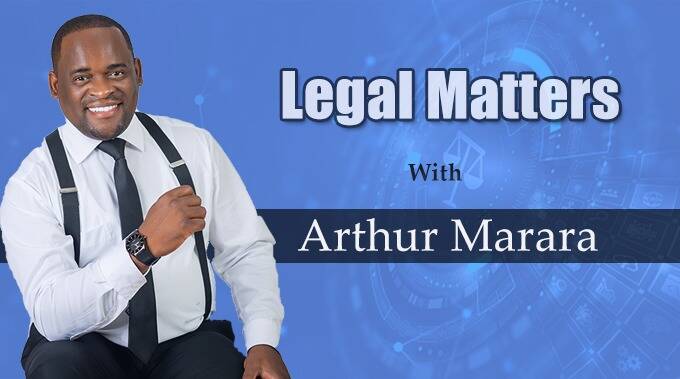
The Sunday Mail

Arthur Marara
Legal Matters
A CLIENT of mine wanted to purchase a piece of land in Harare. We drove to see the developer’s representative for a basic due diligence interview. We were told that our agreement of sale could be processed in minutes. There are no costs for the client and the developer in the production of that particular agreement. That is interesting.
But how?
They have an application that they developed, which immediately processes the agreement as soon as you input the details of the purchaser.
Transaction costs in many instances have scared away potential purchasers. Technology in this particular instance has streamlined a lot of processes.
Explore the use of legal technology and tools to streamline legal processes and reduce administrative costs.
Document management systems, contract automation and e-discovery tools can help improve efficiency and reduce expenses.
The utilisation of legal technology and tools is pivotal in modernising legal processes, enhancing efficiency and minimising administrative costs.
By embracing legal tech solutions such as document management systems, contract automation and e-discovery tools, legal professionals can streamline their workflows and optimise resource allocation.
Electronic system
Have you heard about the Integrated Electronic Case Management System (IECMS)?
The superior courts in Zimbabwe have gone digital. Now, you do not have to go to the High Court to file pleadings. All is being done online. Lawyers are now appearing before the court virtually. There are no fuel costs and no parking fees, only internet costs.
The IECMS is a game-changer. It reduces case backlog, prevents the loss and physical damage of documents in a case file, enhances access to information and modernises the sector’s operations. Most importantly, this has an effect on legal costs. In the past, you would be charged for travelling, filing and service of process.
With this system, the other party is notified when process has been filed. The set down of the matter is also notified through the system and email.
Take time to discuss with your attorneys how the system affects legal fees. Do not just blindly settle bills whose formulae you are not aware of.
Law firms that use technology will always stay ahead of those that do not. Take time to ask your lawyers how much automation and technology they have in their practice. This has an effect on how you are charged.
Disruption is real and the legal field is not being spared.
Legal technology and tools can play a crucial role in managing and reducing legal costs in several ways:
Increased efficiency: By streamlining legal processes through the use of legal technology, tasks that would typically require significant time and resources can be completed much more efficiently. For example, document management systems allow for quick document retrieval, collaboration and version control, saving valuable time that would otherwise be spent on manual searching and organisation. This increased efficiency translates to reduced billable hours and overall cost savings.
Reduced administrative workload: Legal professionals often spend a considerable amount of time on administrative tasks such as document creation, contract reviews and data analysis. Legal technology tools, such as contract automation and e-discovery solutions, automate these processes, minimising the need for manual intervention. They reduce the administrative workload. This allows legal professionals to focus on more strategic and high-value work, maximising their productivity and ultimately minimising costs.
Enhanced accuracy and mitigated risks: Manual work can be prone to errors, resulting in additional costs associated with reworking and potential legal liabilities. By leveraging on legal technology, automation minimises the risk of human error and ensures greater accuracy in legal tasks, such as contract creation, analysis of large volumes of data and legal research. Improved accuracy reduces the likelihood of costly mistakes or disputes, lowering the overall legal costs for clients.
Cost certainty and predictability: Some legal technology tools offer alternative fee arrangements, such as fixed fees or blended rates, which provide cost certainty and predictability for clients. By utilising these alternative fee structures, clients can have a clear understanding of the costs associated with specific legal services, avoiding unexpected or excessive billing. This transparency helps in budgeting and managing legal expenses more effectively.
Reduction of paperwork and physical storage costs: Traditional legal processes often involve substantial amounts of paperwork, which can result in additional expenses for printing, physical storage and retrieval. By embracing document management systems and going digital, law firms can significantly reduce paper-related costs. Electronic documents are easily searchable, shareable and do not require physical storage space, allowing for substantial cost savings.
Competitive bidding and negotiation leverage: Legal technology tools can assist in gathering competitive bids or proposals from different law firms or legal service providers. This provides clients with benchmarking data to evaluate the reasonableness of fees and negotiate more favourable terms.
The ability to access and compare pricing information empowers clients to make informed decisions regarding legal costs and fosters competition among legal service providers, potentially leading to lower rates.
Legal technology and tools contribute to managing legal costs by increasing efficiency, reducing the administrative workload, enhancing accuracy, providing cost certainty, minimising physical storage costs, and facilitating competitive bidding and negotiation leverage. By embracing these technologies, law firms and clients can optimise their legal spend while maintaining the quality of legal services.
LEGAL DISCLAIMER: The material contained in this article is set out in good faith for general guidance in the spirit of raising legal awareness on topical interests that affect most people on a daily basis.
Arthur Marara is a practising attorney, author, human capital trainer, business speaker, thought leader, law lecturer, consultant, legal proctor (University of Zimbabwe), notary public and conveyancer. He is passionate about promoting legal awareness and access to justice. He writes in his personal capacity. You can follow him on social media (Facebook Attorney Arthur Marara), or WhatsApp him on +263780055152 or email [email protected]




